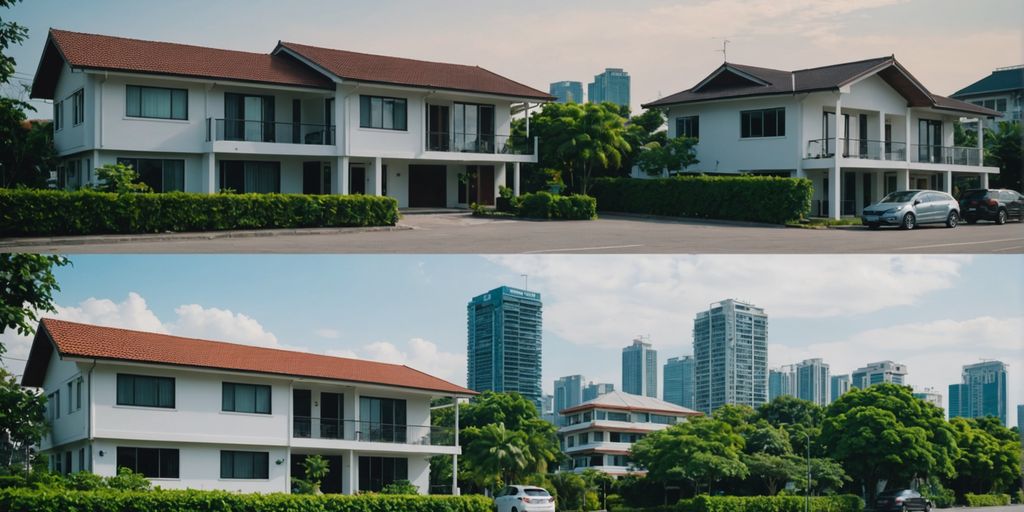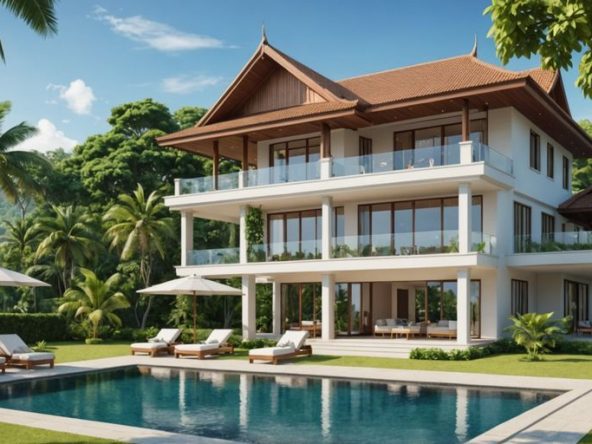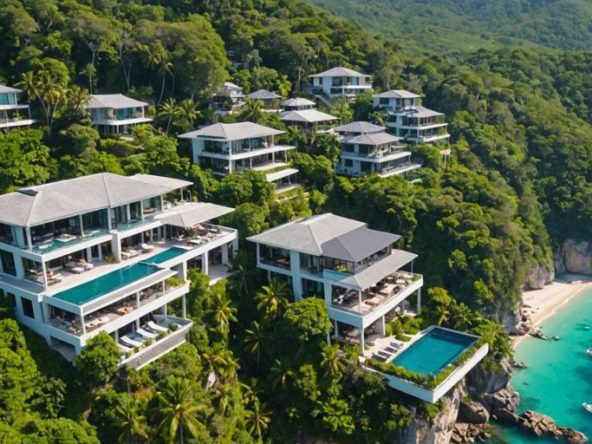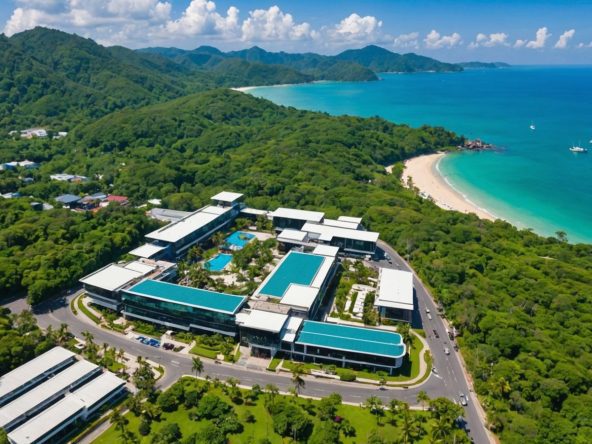When thinking about buying property in Thailand, you have two main choices: leasehold or freehold. Each option has its own set of rules, benefits, and drawbacks. It’s important to understand these differences to make the best decision for your needs and goals. This article will help you learn about both types of property ownership so you can decide which one is right for you.
Key Takeaways
- Leasehold properties in Thailand give buyers the chance to own villas, townhouses, and apartments for a set period.
- Freehold properties, usually condominiums, allow buyers to own the property outright forever.
- Foreigners often choose leasehold due to restrictions on owning land in Thailand.
- Both leasehold and freehold have their own advantages and limitations, depending on your investment goals.
- Consulting with legal experts and doing thorough research can help you make an informed decision.
Understanding Leasehold Property in Thailand
Definition and Legal Framework
In Thailand, leasehold ownership is a common arrangement, especially for foreigners who are restricted from owning land outright. The legal framework for leasehold properties is governed by the Thai Land Code Act. Under this system, individuals or entities can lease land for a specified duration, typically ranging from 30 to 90 years. This allows foreigners to enjoy the benefits of property ownership without violating Thai land ownership laws.
Advantages of Leasehold
Leasehold properties offer several advantages. For one, they provide flexibility in property types, allowing buyers to consider villas, townhouses, and apartments in various locations. This is particularly beneficial for those interested in short term rentals or a Luxury Villa In Thailand. Additionally, leasehold arrangements often come with lower upfront costs compared to freehold properties.
Limitations of Leasehold
Despite its advantages, leasehold ownership has its limitations. The most significant is the temporary nature of the lease, which can range from 30 to 90 years. This can be a drawback for those looking for long-term investment stability. Furthermore, leasehold properties may have restrictions on modifications and usage, which can limit the owner’s control over the property.
Leasehold properties can be a viable option for those looking for flexibility and lower upfront costs, but it’s essential to understand the limitations and legal framework involved.
In summary, leasehold property in Thailand offers a unique opportunity for foreigners to invest in real estate, but it comes with its own set of challenges and limitations. Whether you’re looking for the Best Luxury Villa or a short-term rental, understanding these factors is crucial for making an informed decision.
Exploring Freehold Property in Thailand
Definition and Legal Framework
Freehold property ownership in Thailand allows individuals to have complete ownership of a property, including the land it sits on. This type of ownership is typically available only for condominiums. Foreign buyers can own up to 49% of the total area of all units in a condominium project. This legal framework ensures that foreign investors have a secure and stable investment option.
Advantages of Freehold
One of the main advantages of freehold ownership is the security it offers. Owners have full control over their property without worrying about lease expiration. This is particularly appealing in the Phuket Real Estate Market, where demand for properties remains high. Additionally, freehold properties often have higher resale values, making them a lucrative investment. For instance, a 4-bedroom pool villa in Rawai – Ocean Worldwide is a prime example of a luxurious villa with private pool in Phuket’s gated community, offering a prime location near beaches, shops, and schools.
Limitations of Freehold
Despite its advantages, freehold ownership has its limitations. Foreign buyers are restricted to owning only condominiums, which limits their options compared to leasehold properties. Moreover, the process of purchasing a freehold property can be more complex and time-consuming. It’s essential to consult with legal experts to navigate these challenges effectively.
Freehold ownership in Thailand offers a secure and stable investment option, particularly in the thriving Phuket Real Estate Market. However, it’s crucial to understand the legal restrictions and complexities involved.
In summary, while freehold properties provide security and potential for higher resale value, they come with limitations that require careful consideration. Whether you’re looking at Luxury Villas For Sale or the Best Beach Villas, understanding these factors will help you make an informed decision.
Comparative Analysis: Leasehold vs. Freehold
When comparing leasehold and freehold properties, ownership duration is a key factor. Leasehold properties in Thailand typically offer a 30-year lease, which can be renewed twice, totaling 90 years. In contrast, freehold properties provide permanent ownership, making them a more secure long-term investment.
Leasehold properties often include condominiums and apartments, while freehold properties can range from condos to luxury beachside residences. This variety allows buyers to choose based on their preferences and investment goals.
Leasehold properties are suitable for short to medium-term investments, offering flexibility without the commitment of ownership. Freehold properties, on the other hand, are ideal for long-term investments, with the potential for significant appreciation. It’s essential to review the lease terms and conditions, including renewal options and any restrictions imposed by the lessor.
Both types of ownership serve different purposes and requirements, so it depends on what you are exactly looking for. Usually, people prefer freehold ownership because it gives them assurance of holding the ownership title. As for leasehold property, the 30-year lease that can be renewed twice, for a period of 90 years in total of ‘leased ownership’ is enough and saves the owner from paying the freehold premium fees.
In summary, the choice between leasehold and freehold depends on individual needs and investment goals. Leasehold offers flexibility, while freehold provides absolute control and long-term security.
Legal Aspects of Leasehold and Freehold in Thailand
Thai Property Laws
In Thailand, property laws distinguish between leasehold and freehold ownership. Leasehold is a long-term rental agreement, typically ranging from 30 to 90 years, where the tenant has the right to use the property for the lease term. Freehold, on the other hand, grants complete ownership of the property to the buyer. Foreigners often opt for leasehold due to restrictions on land ownership.
Contractual Obligations
Leasehold agreements come with specific contractual obligations. The leaseholder must adhere to the terms set by the landlord, including payment schedules and property maintenance. Freehold owners, however, have fewer restrictions and more control over their property. It’s crucial to understand these obligations to avoid legal missteps.
Renewal and Extension
Renewal and extension of leasehold agreements can be complex. While some leases offer renewal options, they are not guaranteed and may require renegotiation. Freehold ownership does not have this issue, as the property is owned outright. Prospective buyers should consult legal experts to navigate these complexities effectively.
Investment Strategies for Leasehold Properties
Short-term vs. Long-term Investments
When considering leasehold properties, it’s crucial to distinguish between short-term and long-term investment goals. Leasehold properties are often ideal for those seeking short to medium-term usage. For instance, a renovation investment villa in Surin, Phuket, priced at THB 35,000,000, offers a lucrative opportunity for short-term gains. However, for long-term investments, understanding the lease duration and renewal terms is essential. Leasehold agreements in Thailand typically span 30 years, with options for renewal.
Market Trends
The market for leasehold properties in Thailand is dynamic. Recent trends indicate a growing interest in leasehold properties due to their affordability compared to freehold options. Investors should stay updated on market conditions and emerging hotspots. For example, hillside locations in Phuket are gaining popularity, offering both scenic views and proximity to amenities.
Risk Management
Investing in leasehold properties comes with its own set of risks. It’s vital to review the lease terms and conditions thoroughly. Pay attention to renewal options, restrictions, and any obligations imposed by the lessor. Additionally, consider the transferability of the lease, as this can impact your investment’s liquidity. Always consult with legal experts to navigate the complexities of leasehold agreements effectively.
Leasehold properties can offer flexibility and affordability, making them a viable option for various investment strategies. However, understanding the legal and market nuances is key to maximizing returns.
Investment Strategies for Freehold Properties
Market Trends
Understanding market trends is crucial for making informed investment decisions. Freehold properties in Thailand, especially in popular areas like Phuket and Bangkok, have shown consistent appreciation over the years. Investors can own the property in their name, which adds to its appeal in the resale market. A recent report highlighted a Japanese inspired design villa in Bangtao as a prime example of high-demand properties.
Resale Value
Freehold properties generally have a higher resale value compared to leasehold properties. This is because the ownership is absolute and indefinite, making it more attractive to potential buyers. Additionally, the ability to pass the property onto heirs through a will simplifies succession planning, further enhancing its value.
Risk Management
Investing in freehold properties requires careful risk management. While the potential for long-term gains is significant, it’s essential to consider factors like market volatility and legal obligations. Consulting with legal and financial professionals well-versed in Thai property laws can provide valuable guidance on compliance and ownership structures.
Freehold ownership allows for straightforward inheritance and succession planning. The owner can pass the property to heirs through a will, simplifying the transfer of assets.
Considerations for Foreign Buyers
Legal Restrictions
Foreigners face significant restrictions when it comes to property ownership in Thailand. While Thai nationals can own land outright, foreigners often need to explore alternative legal structures. One common method is setting up a Thai company where the foreigner can own a majority of shares. Understanding these legal restrictions is crucial for any foreign buyer.
Financial Implications
Investing in property in Thailand involves various financial considerations. Foreign buyers should be aware of additional costs such as legal fees, taxes, and potential currency exchange risks. It’s also important to consider the long-term financial implications, including maintenance costs and the potential for property value appreciation or depreciation.
Long-term Residency
For those looking to stay in Thailand long-term, property ownership can be a significant factor. While owning property does not automatically grant residency, it can be part of a broader strategy for long-term stay. Foreign buyers should consult with legal experts to understand how property ownership fits into their residency plans.
Thorough research and legal advice are essential for foreign buyers to navigate the complexities of property ownership in Thailand.
Regional Differences in Property Ownership

Phuket
Phuket is known for its luxurious 3-bedroom sea view private pool villa options, making it a prime location for high-end investments. The island’s property market is characterized by a mix of leasehold and freehold properties, with a significant number of foreign buyers. The demand for sea view properties and private pools is particularly high, driving up prices and making freehold properties more desirable but also more expensive.
Bangkok
Bangkok, the bustling capital of Thailand, offers a diverse range of property types, from high-rise condominiums to traditional houses. Freehold properties in Bangkok are highly sought after due to their potential for high resale value and the ability to pass the property onto heirs. However, the transfer fees and taxes for freehold properties are higher, making leasehold options more attractive for some investors.
Chiang Mai
Chiang Mai, known for its cultural heritage and serene environment, presents a different property market landscape. The city offers more affordable property options compared to Phuket and Bangkok. Leasehold properties are common, providing a cost-effective way for foreigners to invest in the region. The lower cost of living and the city’s charm make it an appealing choice for long-term residency.
When choosing between leasehold and freehold properties in different regions of Thailand, it’s essential to consider the local market trends, property types available, and your long-term investment goals.
Expert Tips for Choosing Between Leasehold and Freehold

When deciding between leasehold and freehold property in Thailand, it’s crucial to consider your personal goals and circumstances. Both types of ownership serve different purposes and requirements, so the best choice depends on what you are looking for.
Consulting with Legal Experts
Consulting with legal and financial professionals who are well-versed in Thai property laws is essential. They can provide guidance on compliance, ownership structures, and the implications of both options. This step ensures you understand the legal framework and avoid potential pitfalls.
Evaluating Personal Goals
Your investment horizon plays a significant role in this decision. If your goal is a long-term investment or permanent residence, freehold might be more suitable. For short to medium-term plans or if the property is primarily for vacation or rental purposes, leasehold could be a practical choice.
Market Research
Thorough research is vital. Look into market trends, property values, and the specific conditions for renewal or extension of leasehold properties. Understanding the market will help you make an informed decision aligned with your goals in Thailand’s real estate market.
There is no one-size-fits-all answer, and the best option depends on individual preferences and specific circumstances. Thorough research, legal advice, and a clear understanding of personal objectives will contribute to making an informed decision aligned with the individual’s goals in Thailand’s real estate market.
Common Pitfalls to Avoid in Property Investment
Legal Missteps
When investing in property, especially in a foreign country, legal missteps can be costly. It’s crucial to understand the local laws and regulations. For instance, in Thailand, foreigners cannot own land outright but can own buildings. Misunderstanding this can lead to significant financial loss. Always consult with a legal expert to navigate these complexities.
Financial Oversights
Financial oversights are another common pitfall. Real estate is often the biggest investment that a person will make in their lifetime, so it’s important to do thorough research and assess all of your options before signing a contract. This includes understanding all the costs involved, such as taxes, maintenance fees, and potential renovation costs. A well-planned budget can prevent unexpected financial strain.
Market Misjudgments
Market misjudgments can also derail your investment. The property market can be volatile, and making assumptions based on current trends can be risky. For example, while Phuket is currently a hot spot for property investment, market conditions can change. Stay informed about market trends and seek advice from experienced investors.
Real estate cannot be lost or stolen, nor can it be carried away. Purchased with common sense, paid for in full and managed with reasonable care, it is about the safest investment in the world.
By avoiding these common pitfalls, you can make more informed and secure property investment decisions.
Investing in property can be tricky if you’re not careful. Many people make mistakes that can cost them a lot of money. To help you avoid these common pitfalls, visit our website. We have a lot of resources that can guide you through the process and make your investment a success.
Conclusion
Deciding between leasehold and freehold property in Thailand ultimately comes down to your personal needs and investment goals. Freehold ownership, limited to condominiums, offers permanent ownership, while leasehold provides flexibility with various property types like villas and townhouses, albeit for a fixed term. Each option has its own set of advantages and limitations. Therefore, it’s crucial to thoroughly research and seek professional advice to make an informed decision that aligns with your long-term objectives. For more detailed guidance, feel free to contact our consultants.




